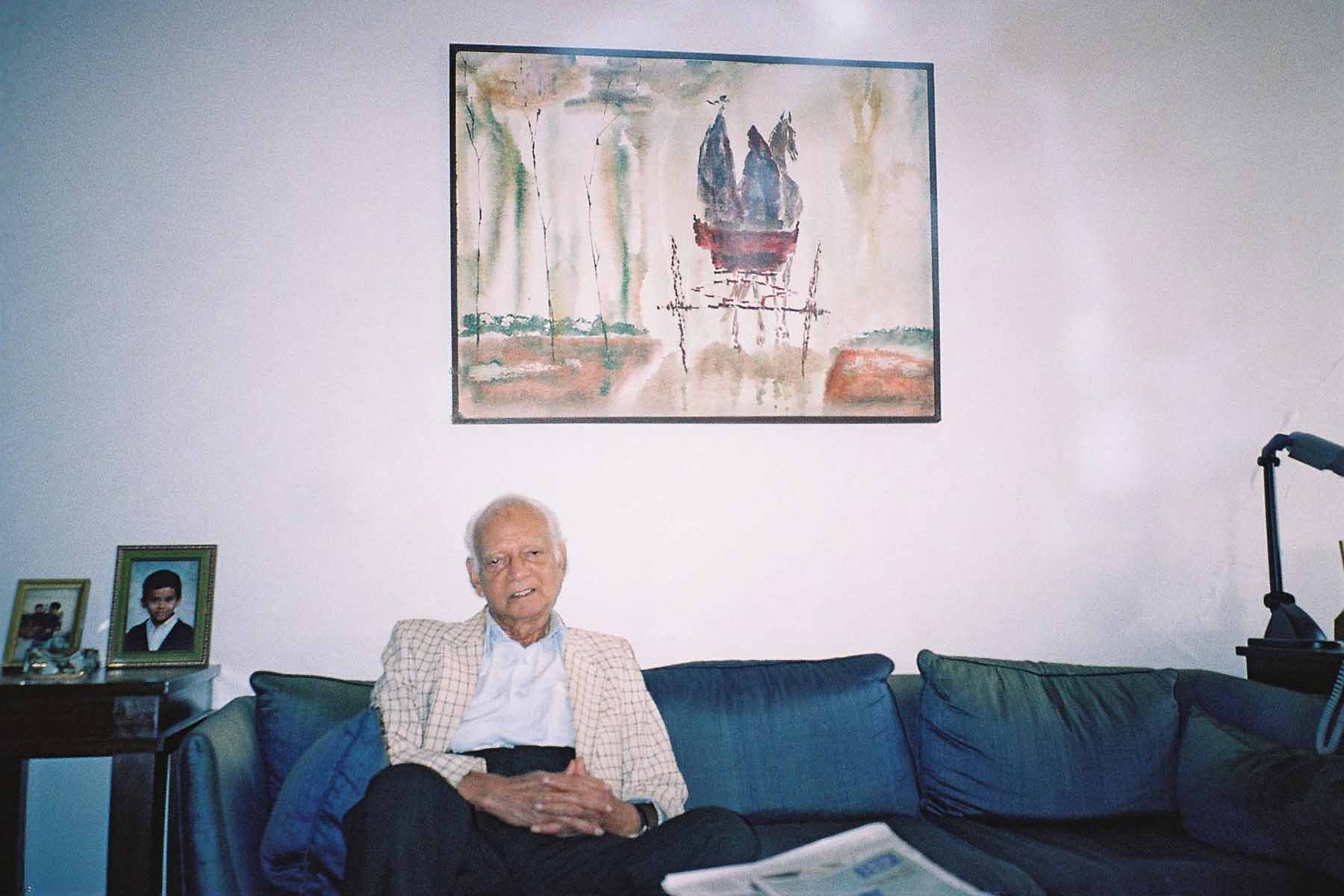General Yaqub Ali Khan
Admiral Syed Muhammad Ahsan (1921-1989) was the Governor and General Sahabzada Yaqub Ali Khan (1920-2016) was the Martial Law Administrator of East Pakistan. They had worked together before. Lieutenant Commander S. M. Ahsan was senior ADC to the governor-general, Quaid-i-Azam Muhammad Ali Jinnah, and Major Yaqub Ali Khan was the commandant of the prestigious governor-general’s bodyguard at the time of independence. They were both Urdu speaking mulkis belonging to Muslim states in India. They were two of the noblest souls I had ever met. Therefore at dinner in the Governor’s House in Dhaka, with Governor Admiral S. M. Ahsan and Martial Law Administrator General Sahabzada Yaqub Ali Khan, conversation was polite, despite our having divergent views on every subject that we discussed, but for my suggestion that we were backward and would remain backward because our thinking was still mired in deductive logic, while the western mind had broken the shackles of Greek philosophy and gone on from deductive to inductive logic. Neither of them agreed with me that this was one day going to blow back into our faces, as our madrassas considered Arastu (Aristotle), the master of deductive logic, to be Ustad-e-Azeem (Great Teacher).
I was, however, impressed by the keenness to understand new ideas and the phenomenal memory of Sahabzada Yaqub, because about half a decade later, while shaking my hand in a reception line for the Aga Khan at Governor’s House Karachi, not only did he recognize me, but he reminded me of the discussion that we had half a decade earlier at Governor’s House Dacca. He also made an appointment to continue the discussion on inductive and deductive logic at the Sind Club, where my friends and I met every Saturday thanks to Husain Haroon, who being unhappy with the deserted look that the Sind Club wore, had agreed that they would provide my friends and me with free nuts and coffee for our gatherings on Saturdays. When Husain was no more president of the club, I had to pay for our coffee for years, till some of my friends realized that it was no more free and sometimes chipped in.
It is a pity that all our original members have passed away. I used to pick up vice chancellor and ambassador Ehsan Rashid, and I.C.S. and ambassador Qamrul Islam from their homes every Saturday, and take them to the Sindh Club for coffee by eleven thirty. They are no more with us. Others who used to join us there but have left us are Abu Qureshi, Safdar Abidi, MH Askari, Mian Ehsan, Iqbal Haider, Ibnul Hasan, Agha Hilali, Ghazanfar Isani, Naseemul Islam, Advocate Nomani and Major Yusuf. Kalam was there before he became Vice-Chancellor of NED University and devoted fully to its improvement. Aftab Ahmed Khan is in a wheelchair. I.H. Siddiqui is not well either. Captain Akbar is nursing his eyes which have endured three failed cataract operations, and developed disagreement with Brigadier A.R. Siddiqui, which does not allow them to be with each other. Ashraf Liaquat Ali Khan died bravely facing cancer, therefore I finally folded the group when I myself fell ill in November 2015.
Apart from the poetry of Ghalib which Aftab Ahmed Khan recited all the time, he was a mine of stories from the corridors of power, e.g. that Manzur Qadir told Field Marshall Ayub Khan in a cabinet meeting on the budget that the finance minister, Mohammad Shoaib, could have wiped out the deficit in the budget by taking into account his personality on the asset side. And that AK Brohi told General Zia that the Holy Prophet had appeared to him in dream to instruct him to serve him, because he was implementing his law. That Mr. Bhutto sent him, and Aziz Ahmed, to get a loan from Saudi Arabia, but the attitude of Aziz Ahmed was such that the Saudi FM complained that Aziz Ahmed was acting as if the Saudi FM was asking him for a loan. Therefore he sent a cyber message, and Aziz Ahmed was recalled and given a dressing down by Mr. Bhutto. That another time Mr. Bhutto told him that as he recited Persian poetry, therefore he should go to Iran to get a loan. Therefore when he met the Iranian FM, he told him either to grant a loan or to give him a job in Iran. Aftab sahib used to recite the following verse;
Pahunchay bhikari daur kar gur hay gadagari ka yay
Jo milay jahan milay jetna milay aur jab milay
And that another time while he was having a meeting with Bhutto he found his minister of religious affairs, Kausar Niyazee, was doing fatigue (running around them on the lawn). Bhutto explained to him that a certain sheikh from the UAE had come to visit him, and that he had asked Niyazee to arrange mujra for him. The Sheikh was pleased, and left a purse for the singer, but Niyazee pocketed it.
It is a great pity that Iqbal Haider died rather young because he had promised to let me have draft of his autobiography, to get my advice on its proof reading and printing. As lawyer of JA Rahim and a minister of Benazir Bhutto he had a lot to disclose, which would have been of interest to historians. Similarly, Naseemul Islam who was married to the favourite sister of Zulfiqar Ali Bhutto, had a lot to say about the Bhutto family with whom he had seen both good and bad times. After his wife’s death, he led a lonely and despondent life, as his only son, who had married Benazir’s friend, first deprived him of his holding in his company, and then tried to get him out of his house by insisting on selling it.
Dr. Ehsan Rashid and I spent one evening every month with Mian Ehsan, who had married pari chehra (angel faced} Naseem Banu, the original superstar of the Indian screen, despite competition from the Crown Prince of Hyderabad. He was a brilliant student of Aligarh, whose marks in physics have yet to be surpassed, and went to London for further study. But he did not have much success at film making in India despite his famous wife. Therefore after partition he migrated to Pakistan to join the family business, leaving his wife Naseem Banu, daughter Saira Bano and his famous son-in-law Dileep Kumar, to continue their interest in the film world of Bombay. Mian Ehsan, driven by retired DIG, Asif Majid in his sports car, was the first to drop in on me every Eid morning, to be followed by my brother, Shakiel.
I almost failed to become a member of the Sindh Club because it was then dominated by Khalid Ali Khan, whom I met after many decades and spontaneously called him Bagga, by which name he was known at school in Lahore. He did not like it, and ruled against me but Pir Mahfooz, who was an Aligarian, recalled me for interview. At the time of partition, politics, bureaucracy and society were dominated by Aligarians, but during the rule of Ayub, who was ironically an Aligarian, power had begun to shift to Government College Lahore, which began to dominate all walks of life. The Sind Club was a good example, having only a few Aligarians left but many Ravians.
A similar group had existed at Karachi Gymkhana and gathered every morning on the veranda next to the entrance for tea ordered by Gul Dada. This group had, among others, three retired police officers who had interesting stories to tell. They were Imtiaz, Saghir and Irfan. Irfan had arrested Hindu militants who had planned to kill the Quaid-i-Azam after partition with their ringleader Advani, who escaped to India to become its Deputy Prime Minister in the Vajpai government. Saghir was retired DIG of railway police. And Imtiaz had retired as DIG Traffic. His son was the Balochistan Governor’s pilot when the plane crashed and he was killed, while the governor survived. Now none of the morning group lives save me.
At the gymkhana track Wahid Qadir use to wait for me every evening to start the walk. He was full of interesting anecdotes from his life as ADC to the British chief of the Pakistan Army and the first Pakistani chief Ayub Khan. One of the most interesting episodes was during the Kashmir war, of an Indian general coming and staying with a Pakistani general who was once a batch mate in the Indian army. It infuriated the Pindi people so much that someone began the rumour that the Pakistani general would be publicly hanged on the following Sunday morning, with the result that a large crowd gathered that Sunday morning to witness it, and had to be dispersed with difficulty.
There was another gentleman who was always on the Gymkhana dance floor with a new dancing partner, and was also at the club every morning. Sometimes Ahmed Maqsood and I joined him. Then one day I saw a lady entering the place with rather uncertain steps, as she was the Sind Club type and did not think that the Gymkhana was a place to be seen. Therefore after they got married they were never seen there again. As he was not a member of the Sind Club, I now and then invited them for lunch there, which they enjoyed. However his son became a member of the Sind Club when his wife became Prime Minister of Pakistan. He told me that he never thought much of his son because of the company he kept, till one day, when he asked him to get married and settle down, he surprised him by saying that he would do so if he could arrange his marriage with Benazir. He assigned the job to his wife who according to Benazir convinced her to marry their son.
Kamar bandhay huyay chalnay ko sab yar baithay hayn
Bahut agay gaya baqi jo hayn tayyar baithay hayn
Bhalla gardish falak ki chain deti hay kisay Insha
Ghanimat hay kay ham surat yahan do char baithay hayn


